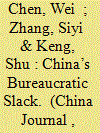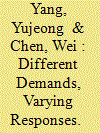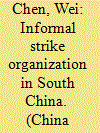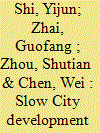|
|
|
Sort Order |
|
|
|
Items / Page
|
|
|
|
|
|
|
| Srl | Item |
| 1 |
ID:
190383


|
|
|
|
|
| Summary/Abstract |
In recent years, Party leaders have expressed concern about “bureaucratic slack,” or shirking, by local government officials. This article investigates the reasons for the emergence of bureaucratic slack in China’s political system. It verifies two popular hypotheses, namely, reduced material inducements and increased risk. Using a unique national survey of 1,789 local cadres, we confirm both hypotheses. Our survey also reveals differences across groups of local cadres. We find bureaucratic slack among lower-ranked cadres to be caused mainly by the lack of material inducements, while higher-ranked officials are more discouraged by increased risks. We conducted follow-up fieldwork to examine in greater depth why each cohort responded differently to the Xi administration’s administrative reforms and anticorruption drives.
|
|
|
|
|
|
|
|
|
|
|
|
|
|
|
|
| 2 |
ID:
175569


|
|
|
|
|
| Summary/Abstract |
While Chinese local governments remain extremely wary of workers’ collective actions, they do not always suppress them; sometimes, they tolerate such actions and even seek to placate workers. What accounts for these different government responses to workers’ collective actions? Based on a sample of over 1,491 collective action cases that took place in Guangdong between 2011 and 2016, we find that the types of demands raised by workers during collective actions affect how local governments respond. Local governments are likely to forcefully intervene in collective actions in which workers make defensive claims concerning issues of payment. In contrast, local governments are likely to use non-forceful approaches in response to actions in which workers make defensive claims regarding social security.
|
|
|
|
|
|
|
|
|
|
|
|
|
|
|
|
| 3 |
ID:
170982


|
|
|
|
|
| Summary/Abstract |
In contrast to the workers who organize strikes in the West, Chinese workers lack support from official unions and have to rely on informal ways to strike. The previous literature suggests that worker-leaders have played a role in initiating wildcat strikes, and the engagement of labor NGOs has also facilitated grassroots activism. The focus of previous studies has been on the emergence, approaches, and strategies of the actors involved in different labor protests. However, we still know little about the direct or unintended consequences of the numerous strikes in South China. Based on fieldwork in the Pearl River Delta, this article explores how the informal strike organization built by workers, namely the "worker representative mechanism," contributes to favorable outcomes for labor. By conducting a comparative case study, this article identifies two important factors that have impacted strike outcomes: how this mechanism builds up a wider representation when the union is absent and how it sustains its core leadership for successive strikes and accomplishment of strike goals. By examining how workers build the representative mechanism that, in practice, acts as an informal strike organization, this article illustrates an alternative pattern of organization in strikes that bypasses trade unions and discusses its influences on emerging Chinese labor activism.
|
|
|
|
|
|
|
|
|
|
|
|
|
|
|
|
| 4 |
ID:
167054


|
|
|
|
|
| Summary/Abstract |
The Slow City concept advocates the development of cities by combining modern technologies and traditional lifestyles to provide efficient transportation and communication and high quality of life for the residents. This study investigates the present situation, development approach and public acceptability of the Slow City concept in China. Based on the theory and the practical application of the Slow City concept in major member countries, the development process of Slow City can be divided into three stages: the origin stage, the development stage and the promotion stage. This study shows that the Slow City development in China is at the third stage. Due to diverse economic foundations, cultural traditions and the sociopolitical environment, the Slow City in China represents different features compared to the Slow City in Europe. A systematic analysis provides a better understanding of the situation of the Chinese Slow City. Then, the authors evaluate the degree of acceptability of the Slow City concept in China based on three aspects: the understanding, the awareness, and the popularity of the Slow City. Based on the results, this paper suggests optimistic growth opportunities for the Slow City in China and provides several strategies with regard to diverse perspectives.
|
|
|
|
|
|
|
|
|
|
|
|
|
|
|
|
|
|
|
|
|